|
|
|
Sort Order |
|
|
|
Items / Page
|
|
|
|
|
|
|
| Srl | Item |
| 1 |
ID:
154125


|
|
|
|
|
| Summary/Abstract |
The human induced disturbances have led to a severe ecological imbalance and problems such as erosion, flooding, inundation, food shortages, destruction of crops, and overpopulation. The ecological disturbances and poor sanitation has severely affected the human health resulting in growth of various diseases. Although the people of Maldives are learning to live with these challenges but the devastation due to ecological imbalance always has an upper hand.
|
|
|
|
|
|
|
|
|
|
|
|
|
|
|
|
| 2 |
ID:
148158


|
|
|
|
|
| Summary/Abstract |
This article addresses how transnational groups affect the security relationship between the states they reside in. I argue that this is determined by the differential threat perceptions of the host states. If the host states both consider the group to be a threat, the group is a shared problem and policy toward the group becomes an arena for cooperation for the two states. However, if one state views the group as a threat and the other does not, policy toward the group becomes an arena for conflict between them. I test this hypothesis with a comparative case study analysis of Turkey's relationships with the United States, Syria, and Iran vis-à-vis the Kurds after the United States’ invasion of Iraq in 2003.
|
|
|
|
|
|
|
|
|
|
|
|
|
|
|
|
| 3 |
ID:
188207


|
|
|
|
|
| Summary/Abstract |
How do domestic politics affect the management of alliances? Contra Snyder (1984), I argue that states’ alliance management strategies do not arise solely in response to the external threat environment but rather differing perceptions of it by party leaders. I illustrate my argument through a plausibility probe of the U.S.-South Korean military alliance, demonstrating how South Korean leaders’ partisan interpretations of the threat environment affected intra-alliance bargaining in the coordination of military affairs. Consistent with the framework developed here, I find that partisan differences do a better job explaining alliance dynamics over the past quarter century than systemic factors alone.
|
|
|
|
|
|
|
|
|
|
|
|
|
|
|
|
| 4 |
ID:
176542


|
|
|
|
|
| Summary/Abstract |
The systemic shift triggered by a progressive retrenchment of the United States (US) from the wider Middle East region has been a fundamental game changer in the security perceptions of the Gulf Cooperation Council (GCC) monarchies. The retrenchment activated a security dilemma in US-GCC relations, especially in relation to their view of Iran. However, the impact was uneven. While the dilemma triggered fears of abandonment in the three more hawkish players – Saudi Arabia, the UAE and Bahrain –, it generated fears of entrapment in the three less hawkish players – Oman, Kuwait and Qatar. The key differences between these two camps lie on their threat perceptions. Seemingly shaped by state ideology and religion, narratives of identity, socio-political demography and, finally, leadership cognition, these fears interact with domestic factors such as structural vulnerabilities, to affect the perception of Iran as an existential or non-existential risk.
|
|
|
|
|
|
|
|
|
|
|
|
|
|
|
|
| 5 |
ID:
142400
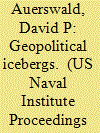

|
|
|
| 6 |
ID:
084280


|
|
|
| 7 |
ID:
075467


|
|
|
| 8 |
ID:
088415


|
|
|
|
|
| Publication |
2009.
|
| Summary/Abstract |
Does exposure to terrorism lead to hostility toward minorities? Drawing on theories from clinical and social psychology, we propose a stress-based model of political extremism in which psychological distress-which is largely overlooked in political scholarship-and threat perceptions mediate the relationship between exposure to terrorism and attitudes toward minorities. To test the model, a representative sample of 469 Israeli Jewish respondents was interviewed on three occasions at six-month intervals. Structural Equation Modeling indicated that exposure to terrorism predicted psychological distress (t1), which predicted perceived threat from Palestinian citizens of Israel (t2), which, in turn, predicted exclusionist attitudes toward Palestinian citizens of Israel (t3). These findings provide solid evidence and a mechanism for the hypothesis that terrorism introduces nondemocratic attitudes threatening minority rights. It suggests that psychological distress plays an important role in political decision making and should be incorporated in models drawing upon political psychology.
|
|
|
|
|
|
|
|
|
|
|
|
|
|
|
|
| 9 |
ID:
185189
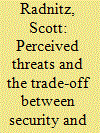

|
|
|
|
|
| Summary/Abstract |
It is well established that exposure to threats causes citizens to prioritize security considerations and accept restrictions on civil liberties. Yet most studies on which these findings are based come from longstanding democracies and do not distinguish among types of threat. This article argues that the effects of internal and external threats are conditional on regime type. It tests the argument via an experiment embedded in an original survey of Georgia and Kazakhstan, countries that vary in regime type but face similar levels of threat. In authoritarian Kazakhstan, there is no difference in attitudes by threat type, whereas external threats produce greater support for security than internal ones in more pluralistic Georgia. Contrary to previous research, security preferences are not mediated by the triggering of anxiety. The findings contribute to literatures on the link between threats and authoritarian preferences, the rally-round-the-flag effect, and the ways that political institutions mediate psychological processes.
|
|
|
|
|
|
|
|
|
|
|
|
|
|
|
|
| 10 |
ID:
185800
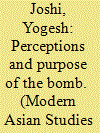

|
|
|
|
|
| Summary/Abstract |
Much of the literature on India's nuclear programme assumes that China's nuclear capability drove New Delhi, the strategically weaker actor, to pursue a nuclear weapons capability. China's nuclear tests not only rendered New Delhi militarily insecure and dented its claim for the leadership of the Third World but they also polarized the domestic debate over the utility of the bomb. In the global scheme of nuclear proliferation, therefore, India was just another fallen nuclear domino. Marshalling recently declassified documents, this article revisits India's nuclear behaviour during the crucial decade between 1964 and 1974. By focusing on threat assessments made at the highest levels and internal deliberations of the Indian Government, this article shows how, contrary to the claims made in the literature, Indian decision-makers did not make much of the Chinese nuclear threat. This conviction emanated out of their distinct reading of the purpose of nuclear weapons in China's foreign and military policy; their perceptions of how India could achieve nuclear deterrence against China by using the bipolar international politics of the Cold War; and, finally, their understanding of the political costs of developing an indigenous nuclear response to China's nuclear threat. New Delhi's nuclear restraint resulted from its perceptions of Chinese nuclear intentions and its beliefs about the purpose of the bomb in Sino-Indian relations. India's perceptions of China as a nuclear adversary and its decision-makers’ views on the purpose of nuclear weapons in this rivalry were fundamentally different from the expectations set out by the domino theory of nuclear proliferation.
|
|
|
|
|
|
|
|
|
|
|
|
|
|
|
|
| 11 |
ID:
168610


|
|
|
|
|
| Summary/Abstract |
Despite various analyses of the extent of Iranian-Russian rapprochement, questions still remain about its fundamental elements and its sustainability in the face of the conflicting interests of the two countries. Iran and Russia have pursued security convergence as a joint power maximisation policy, which can be better understood through Iran and Russia’s common feelings of ‘international misrecognition’ and ‘common threat perceptions’. These are the pillars of the nexus between them, explaining how the two countries have a shared understanding of their security environment and particularly how their mutual sense of insecurity has taken the lead in forging bilateral relations. As long as these pillars remain effective, existing limits to bilateral relations rooted in mistrust, disagreements and rivalries will not have significant effects on the convergence.
|
|
|
|
|
|
|
|
|
|
|
|
|
|
|
|
| 12 |
ID:
161598
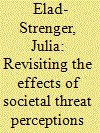

|
|
|
|
|
| Summary/Abstract |
Past research has produced convincing evidence for the association between perceived societal threat and political conservatism. Based on the view of political worldviews and threat perceptions as multifaceted constructs, the present study suggests that certain types of perceived threat are actually associated with the endorsement of more politically liberal positions. Employing a three-wave naturalistic design, we examined the unique longitudinal effects of perceived threats from real-life political events that challenge either liberal or conservative values, on conflict-related attitudes, using a nationally representative sample of Jewish-Israelis (N = 437). Consistent with our hypotheses, perceived threat from events that challenge conservative values was associated with increased militaristic attitudes and decreased willingness to compromise for peace over time, whereas perceived threat from events that challenge liberal values was related to decreased militaristic attitudes and increased willingness to compromise for peace over time. Theoretical and practical implications of these longitudinal effects are discussed.
|
|
|
|
|
|
|
|
|
|
|
|
|
|
|
|
| 13 |
ID:
152718
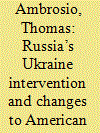

|
|
|
|
|
| Summary/Abstract |
The Russian Federation’s intervention in Ukraine in the spring of 2014 triggered a significant shift in the US government’s perception of that country. Before that event, statements by US officials depicted Russia as a non-threatening potential partner with compatible interests and common security concerns. After the Ukraine intervention, officials characterized Russia as a significant threat to the United States, its allies, and the European regional order. This article explains why the intervention precipitated such a profound change in American threat perceptions—that is, it links the action (Russia’s intervention in Ukraine) to the reaction (the US change in threat assessments). Through a detailed examination of executive branch testimony to the House and Senate Armed Services Committees from January 2008 to February 2016, this article demonstrates that Russia’s intervention in Ukraine was seen by the United States as an unacceptable breach of international law and norms, including the principles of state sovereignty, the sanctity of borders, and territorial integrity. From the American perspective, Russia’s violation of these fundamental rules necessitated a questioning of prevailing American assumptions about Russia. Furthermore, the potential for future aggression by Russia had to be taken seriously. It was this factor of Russia as a “rule breaker” that directly led the United States to reassess the threat posed to it by Russia, rather than alternative explanations such as the application of new Russian military tactics, an increase in Russian military capabilities, politics surrounding Russian national identity or system of government, or Ukraine’s geopolitical value to the United States.
|
|
|
|
|
|
|
|
|
|
|
|
|
|
|
|
| 14 |
ID:
171983


|
|
|
|
|
| Summary/Abstract |
What factors influence whether allies have the same understandings of threats and adversaries? Allies may infer they share each other's views without verifying if this is so, with harmful consequences. A set of psychological biases can cause policymakers to neglect valuable information held by one or more allies, and instead disproportionately discuss information that every allied contributor to a threat assessment already knows. Psychologists call the unshared assessments “hidden profiles”: an evaluative profile that postulates key features of a problem or threat, hidden in the sense that it is unintentionally withheld from the wider group. This manuscript compares the hidden-profiles model and alternative theories of threat perception using the 1956 Suez Crisis as a case study
|
|
|
|
|
|
|
|
|
|
|
|
|
|
|
|
| 15 |
ID:
101487
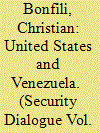

|
|
|
|
|
| Publication |
2010.
|
| Summary/Abstract |
US-Venezuelan relations dramatically worsened under the Bush and Chávez administrations. Notwithstanding, evidence suggests that increasing polarization has not weakened mutually beneficial economic ties. How can we account for the co-existence of interdependence and antagonism? In addressing this question, this article examines both the economic/energy and the political/strategic sectors of bilateral interaction. It argues that the co-existence of interdependence and antagonism needs to be understood within the wider context of two simultaneous yet divergent constellations of socially constructed perceptions, identities, and practices. While the constellation driving political/strategic interaction has revealed the internalization of role identities reflecting rivalry, the one guiding energy interaction has been sustained by role identities reflecting partnership based on interest. Significantly, the former has not taken over the latter, as the lack of shared threat perceptions relative to energy interdependence is the result of deeply internalized identities and a highly institutionalized social process. As a corollary, neither of these constellations has come to govern overall US-Venezuelan relations, and thus co-existence will most likely endure unless energy interdependence becomes the object of processes of constructing threat perceptions.
|
|
|
|
|
|
|
|
|
|
|
|
|
|
|
|
| 16 |
ID:
173944


|
|
|
|
|
| Summary/Abstract |
Perceptions of threat from Russia’s military activities in Ukraine and President Trump’s critical attitude towards NATO have put the idea of a common European army on the agenda of European politics. Do these strategic threat perceptions also influence public support for the creation of a common European army? Previous research has largely overlooked strategic threat perceptions as individual-level determinants of public support for a common European army. This article explores the empirical relationship between strategic threat perceptions and support for a common European army at the individual level of analysis with representative German survey data from 2018. The multivariate analysis shows that perceiving Russia’s military activities in Ukraine as a threat to Germany’s security, and U.S. foreign and security policy as a threat to the cohesion of NATO significantly increases support for the creation of a common European army, even when the influence of numerous other determinants is controlled for. The findings highlight the importance of considering strategic threat perceptions in future analyses of public opinion on European defence cooperation and integration.
|
|
|
|
|
|
|
|
|
|
|
|
|
|
|
|
|
|
|
|
|